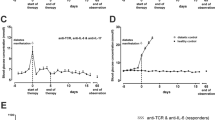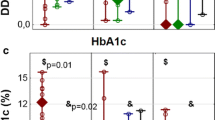Abstract
Cytoplasmic islet cell antibodies, glutamic acid decarboxylase autoantibodies, spontaneous insulin autoantibodies, and insulin-induced antibodies were analyzed in a 1-year follow-up study of 12 newly diagnosed patients with insulin-dependent diabetes mellitus aged 14±2 years (range 7–20 years) who had been initially treated with either multiple injections of insulin alone (control group) or, in addition, anti-CD4 monoclonal antibody/prednisolone (treatment group). Despite individual variations in islet cell antibody titers, there were no significant differences in the prevalence or changes in the mean titers between the two groups. Glutamic acid decarboxylase autoantibodies remained almost unchanged, but correlated with levels of islet cell antibodies. While at initiation of treatment only 50% of the patients from both groups had spontaneous insulin autoantibodies, all patients developed insulin-induced antibodies upon conventional insulin therapy during the course of follow-up. This was not related to islet cell antibody or glutamic acid decarboxylase antibody levels. The insulin requirement was markedly reduced through the period of follow-up, but did not significantly differ between the two groups. A correlation between islet cell antibody levels and insulin requirement was observed in the control group but not in the treatment group. Plasma levels of the antibodies were not associated with changes in stimulated C-peptide or hemoglobin A1 concentrations. Activated T-lymphocytes persisted in both groups of patients, but their mean levels were not significantly different. The reason for the absence of statistically significant differences between treatment and control groups could be due to the small number of patients in the study. In conclusion, short-term immune intervention with anti-CD4 monoclonal antibody in addition to insulin therapy did not suppress autoimmune reactions towards the beta cells.
Similar content being viewed by others
References
Hänninen A, Jalkanen S, Salmi M, Toikkanen S, Nikolakaros G, Simell O. Macrophages, T cell receptor usage, and endothelial cell activation in the pancreas at the onset of insulin-dependent diabetes mellitus. J Clin Invest 1992; 90:1901.
Itoh N, Hanafusa T, Miyazaki A, Miyagawa JI, Yamagata K, Yamamoto K, Waguri M, Imagawa A, Tamura S, Inada M, Kawata S, Tarui S, Kono N, Matsuzawa Y. Mononuclear cell infiltration and its relation to the expression of major histocompatibility complex antigens and adhesion molecules in pancreas biopsy specimens from newly diagnosed insulin-dependent diabetes mellitus patients. J Clin Invest 1993;92:2313.
Conrad B, Weldmann E, Trucco G, Rudert WA, Behboo R, Ricordi C, Rodrigues-Rilo H, Finegold B, Trucco M. Evidence for superantigen involvement in insulin-dependent diabetes mellitus aetiology. Nature 1994;371:351.
Horneff G, Burmeister GR, Emmrich F, Kalden JR. Treatment of rheumatoid arthritis with an anti-CD4 monoclonal antibody. Arthritis Rheum 1991;34:129.
Hiepe F, Volk HD, Apostoloff E, Baehr R von. Treatment of severe systemic lupus erythematosus with anti-CD4 monoclonal antibody. Lancet 1991;II:1529.
Emmrich J, Seyfahrt M, Fleig WE, Emmrich F. Treatment of inflammatory bowel disease with anti-CD4 monoclonal antibody. Lancet 1991;I:570.
Riethmüller G, Rieber EP, Kiefersauer S, Prinz J, Luppe P van der, Meiser B, Breeveld F, Eisenburg J, Krüger K, Deutsch K, Sanders M, Reiter C. From antilymphocyte serum to therapeutic monoclonal antibodies: first experiences with a chimeric CD4 antibody in the treatment of autoimmune disease. Immunol Rev 1992;129:81.
Leslie RDG, Carotenuto P, Pozzilli P. New developments in nonspecific and semi-specific immunosuppression in type I diabetes. Diabetes Metab Rev 1993;9:257.
Mandrup-Poulsen T, Nerup J, Stiller CR, Marner B, Bille G, Heinrichs D, Martell R, Dupre J, Keown PA, Jenner MR, Rodger NW, Wolfe B, Graffenried BV, Binder C. Disappearance and reappearance of islet cell cytoplasmic antibodies in cyclospori-in-treated insulin-dependent diabetics. Lancet 1985;I:599.
Petersen JS, Dyrberg T, Karlsen AE, Molwig J, Michelsen B, Nerup J, Mandrup-Poulsen T. The Canadian-European Randomized Control Trial Group. Glutamic acid decarboxylase (GAD6.5) autoantibodies in prediction of β-cell function and remission in recent-onset IDDM after cyclosporin treatment. Diabetes 1994; 43:1291.
Hehmke B, Kuttler B, Laube F, Gens E, Michaelis D, Hahn HJ, Schulze-Koops H, Emmrich F. Anti-CD4 monoclonal antibody immune intervention in patients with newly diagnosed type I (insulin-dependent) diabetes mellitus. Diabetes Nutr Metab 1994; 7:273.
Kohnert KD, Rjasanowski I, Hehmke B, Hamann J, Keilacker H, Michaelis D. The detection of autoantibodies to pancreatic islet cells by immunoenzyme histochemistry. Diabetes Res 1994;25:1.
Lühder F, Schlosser M, Mauch L, Haubruck H, Rjasanowski I, Michaelis D, Kohnert KD, Ziegler M. Autoantibodies against GAD6.5 rather than GAD67 precede the onset of type I diabetes. Autoimmunity 1994;19:71.
Keilacker H, Rjasanowski I, Besch W, Kohnert KD. Autoantibodies to insulin and proinsulin in type I diabetic patients and in at-risk probands differentiate only little between both antigens. Horm Metab Res 1995;27:90.
Rjanosanowski I, Michaelis D, Keilacker H. 5-year follow-up study of C-peptide secretion in newly-diagnosed type I diabetics: relations to HLA-phenotype, insulin requirement and metabolic control. Exp Clin Endocrinol 1987;89:216.
Silverstein J, Maclaren N, Riley W, Spillar R, Radjenovic D, Johnson S. Immunosuppression with azathioprine and prednisone in recent-onset insulin-dependent diabetes mellitus. N Engl J Med 1988;319:599.
Cook J, Hudson I, Harrison LC, Dean B, Colman PG, Werther GA, Warne GL, Court JM. Double-blind controlled trial of azathioprine in children with newly diagnosed type I diabetes. Diabetes 1989;38:779.
Author information
Authors and Affiliations
Rights and permissions
About this article
Cite this article
Kohnert, K.D., Hehmke, B., Keilacker, H. et al. Antibody response to islet antigens in anti-CD4/prednisolone immune intervention of type 1 diabetes. Int J Clin Lab Res 26, 55–59 (1996). https://doi.org/10.1007/BF02644777
Received:
Accepted:
Issue Date:
DOI: https://doi.org/10.1007/BF02644777




